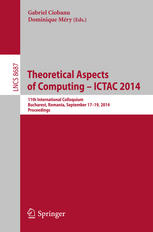

Most ebook files are in PDF format, so you can easily read them using various software such as Foxit Reader or directly on the Google Chrome browser.
Some ebook files are released by publishers in other formats such as .awz, .mobi, .epub, .fb2, etc. You may need to install specific software to read these formats on mobile/PC, such as Calibre.
Please read the tutorial at this link: https://ebookbell.com/faq
We offer FREE conversion to the popular formats you request; however, this may take some time. Therefore, right after payment, please email us, and we will try to provide the service as quickly as possible.
For some exceptional file formats or broken links (if any), please refrain from opening any disputes. Instead, email us first, and we will try to assist within a maximum of 6 hours.
EbookBell Team

4.0
66 reviewsThis book constitutes the refereed proceedings of the 11th International Colloquium on Theoretical Aspects of Computing, ICTAC 2014 held in Bucharest, Romania, in September 2014. The 25 revised full papers presented together with three invited talks were carefully reviewed and selected from 74 submissions. The papers cover various topics such as automata theory and formal languages; principles and semantics of programming languages; theories of concurrency, mobility and reconfiguration; logics and their applications; software architectures and their models, refinement and verification; relationship between software requirements, models and code; static and dynamic program analysis and verification; software specification, refinement, verification and testing; model checking and theorem proving; models of object and component systems; coordination and feature interaction; integration of theories, formal methods and tools for engineering computing systems; service-oriented architectures: models and development methods; models of concurrency, security, and mobility; theories of distributed, grid and cloud computing; real-time, embedded, hybrid and cyber-physical systems; type and category theory in computer science; models for e-learning and education; case studies, theories, tools and experiments of verified systems; domain-specific modeling and technology: examples, frameworks and practical experience; challenges and foundations in environmental modeling and monitoring, healthcare, and disaster management.